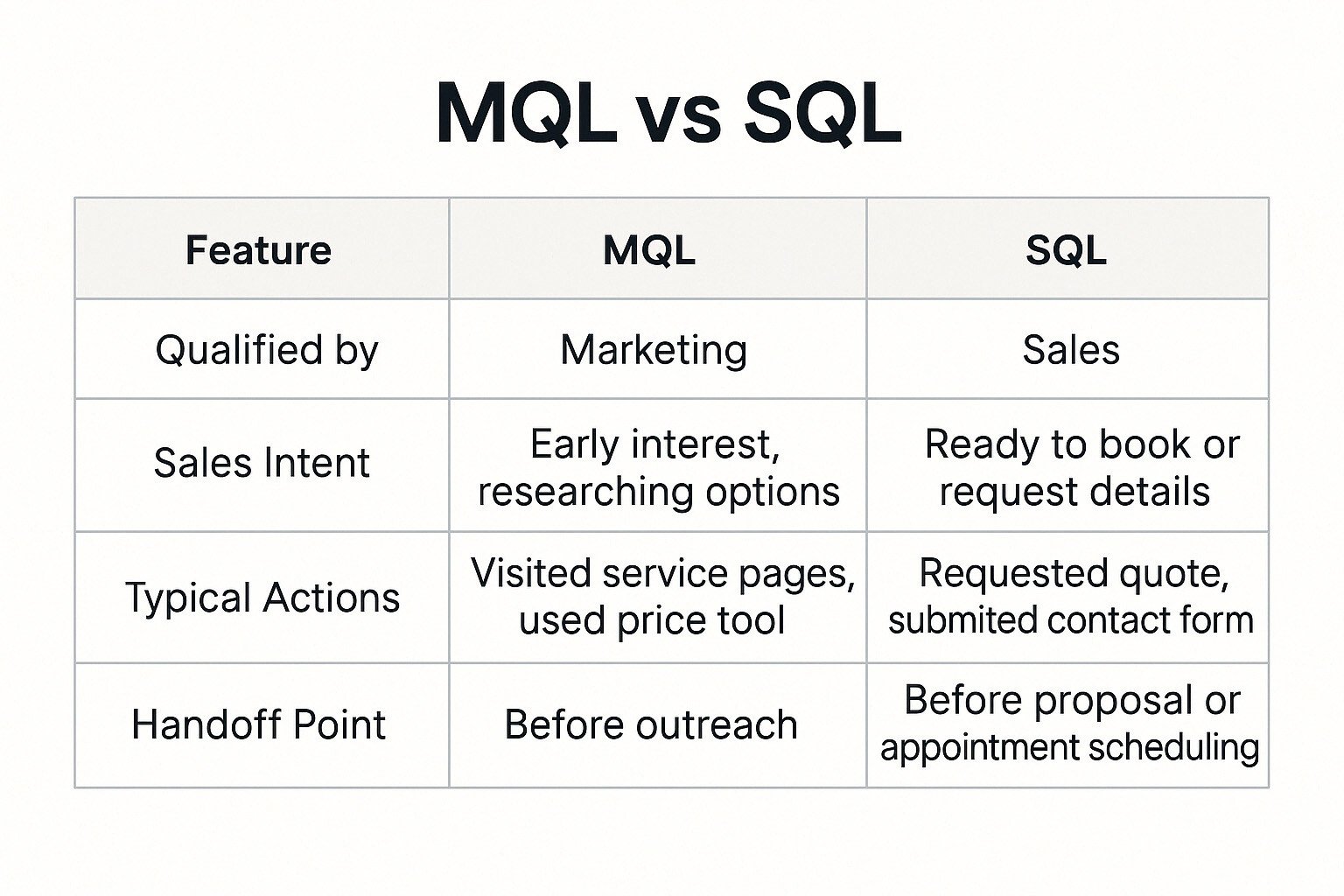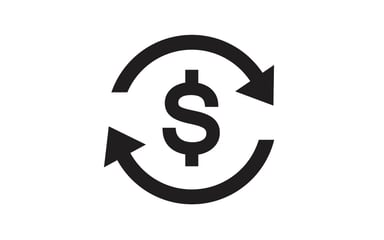What Is a Marketing Qualified Lead (MQL)?
In lead-heavy industries like roofing, insurance, or legal, not every lead is ready to book. Calling every contact is a waste of time and money. That’s where Marketing Qualified Leads (MQLs) come in—they help you focus on the people most likely to convert.
A Marketing Qualified Lead (MQL) is a lead that has engaged with your marketing but is not yet ready to speak with sales. MQLs meet specific behavioral or demographic criteria that suggest buying intent. Identifying and managing Marketing Qualified Leads helps companies focus their sales efforts on higher-quality prospects.
MQL Meaning: What Makes a Lead "Marketing Qualified"?
A lead becomes a Marketing Qualified Lead when they show meaningful interest in a product or service, such as:
- Filling out a lead form
- Downloading an eBook or guide
- Subscribing to a newsletter
- Visiting high-value pages on a website
- Matching a predefined buyer persona or ideal customer profile (ICP)
Marketing teams define these criteria to prioritize leads for nurturing or sales review.
MQL vs SQL: What's the Difference?
The key difference between a Marketing Qualified Lead (MQL) and a Sales Qualified Lead (SQL) is sales readiness. MQLs are the stage before SQLs in the lead lifecycle. A lead becomes an SQL when it shows interest in moving toward a sales-related action.
Visual comparison chart showing how MQLs and SQLs differ by qualification, intent, behavior, and timing:
Why Are Marketing Qualified Leads Important?
Marketing Qualified Leads play a crucial role in the lead lifecycle:
- Improve sales efficiency by filtering out low-interest leads
- Align marketing and sales with clear handoff rules
- Support pipeline forecasting by identifying early-stage interest
- Guide lead nurturing strategies using engagement signals
Well-defined MQL criteria improve conversion rates across the funnel.
Practical Example: How MQLs Improve Lead Quality
Example: Local Roofing Company
Imagine a roofing company running paid ads and SEO campaigns across several cities. They're generating hundreds of leads per week, but many aren't ready for a sales call. Some are renters, others just browsing, and a few are outside the service area.
To solve this, the marketing team sets up a Marketing Qualified Lead (MQL) framework:
-
Leads are scored based on criteria like homeownership, ZIP code, interest in services (e.g., roof leaks), and online engagement.
-
Leads that meet the threshold (e.g., homeowners in service areas who request pricing) are marked as MQLs.
-
Leads below the threshold receive automated follow-ups with seasonal promotions or maintenance tips to build intent over time.
-
Only MQLs are routed to sales reps or call center agents.
Results:
-
Reps spend less time calling unqualified leads.
-
Follow-up speed improves, leading to higher booking rates.
-
Marketing gains visibility into which channels produce leads likely to convert.
-
Lead-to-job conversion increases by focusing on qualified prospects.
This type of MQL process helps service-based businesses prioritize high-intent leads, reduce sales waste, and drive more efficient growth.
Common Challenges in MQL Management
Despite their benefits, many organizations struggle with Marketing Qualified Lead implementation:
- Misalignment between sales and marketing: Different definitions of "qualified" create friction when leads are passed to sales prematurely
- Inaccurate scoring models: Overvaluing certain behaviors while undervaluing others can result in incorrect qualification
- Slow response times: Even well-qualified MQLs go cold if not contacted promptly
- Inadequate nurturing: MQLs that aren't ready for sales need continued engagement
- Poor tracking: Without proper attribution, it's difficult to determine which marketing efforts generate quality MQLs
Addressing these challenges requires ongoing communication between teams and regular refinement of qualification criteria.
Key Metrics for Measuring MQL Effectiveness
Tracking the right metrics helps consumer-focused businesses improve lead quality, response speed, and conversion rates. Here are the most important indicators:
-
MQL-to-SQL Conversion Rate: Measures how many marketing-qualified leads turn into real sales opportunities. In B2C, strong performers see 20%–35% conversion, especially with fast follow-up.
-
Time to SQL Conversion: Tracks how quickly qualified leads become ready for a quote, consultation, or appointment. Shorter times typically mean better engagement and faster revenue.
-
MQL Source Performance: Identifies which marketing channels (e.g., Google Ads, Facebook, SEO) generate the most qualified leads. This helps you focus budget on what works.
-
Cost Per MQL: Calculates the average cost to generate a qualified lead. For B2C industries, this might range from $30–150 depending on competition and location.
-
MQL Velocity: Measures how fast MQLs move through your funnel. A slow pipeline might mean weak follow-up or low buyer urgency.
-
MQL Aging Report: Shows how long leads remain in MQL status without converting. Stale leads may need re-engagement or disqualification.
These metrics help service-based companies prioritize follow-up, allocate budget effectively, and identify where leads are dropping off.
Advanced Lead Scoring Methodologies
Modern Marketing Qualified Lead identification goes beyond basic scoring models:
Predictive Lead Scoring
Uses AI to analyze historical conversion data and identify patterns among high-performing leads.
Intent-Based Scoring
Weigh signals such as visits to pricing pages or competitor comparisons more heavily than generic actions.
Decay Modeling
Reduces scores over time for inactive leads, keeping the MQL list current.
Behavioral Sequence Scoring
Values specific sequences of engagement over isolated actions (e.g., downloading a guide, then visiting pricing).
Where Do MQLs Fit in the Lead Lifecycle?
Understanding where a Marketing Qualified Lead fits helps clarify the overall sales journey:
Lead Capture → MQL → SQL → Opportunity → Customer
A lead becomes an MQL when it meets marketing’s predefined criteria. Continued engagement promotes it to SQL status.
How Lead Management Platforms Handle MQLs
Lead management platforms like SalesExec help businesses:
- Automatically score and flag MQLs based on rules
- Route qualified leads to the right reps
- Track lead status across MQL, SQL, and opportunity stages
- Speed up response times and reduce lead leakage
These tools ensure Marketing Qualified Leads are handled consistently and efficiently.
Summary
A Marketing Qualified Lead (MQL) is a lead that has demonstrated interest in your offering but isn’t ready to speak with sales. MQLs are critical for improving lead qualification, aligning sales and marketing, and increasing conversion rates.
With proper implementation, companies often see 30–50% improvement in sales and significantly higher ROI from marketing.
Frequently Asked Questions (FAQ)
What qualifies someone as a Marketing Qualified Lead (MQL)?
A potential customer becomes an MQL when they show clear interest and match criteria that suggest they are likely to book or buy. This could include requesting a quote, using a price calculator, or entering a valid ZIP code in a lead form.
How is an MQL different from a regular lead?
A regular lead may visit your website or landing page once. An MQL takes a more intentional step, such as filling out a form, returning to the site, or engaging with follow-up emails. This indicates they're closer to making a decision.
How long should a lead stay in MQL status?
In most consumer-focused businesses, MQLs convert to qualified sales leads within a few days to two weeks. If they don’t move forward, they may need nurturing (e.g., reminders or offers) or be removed from the active pipeline.
What is a good MQL-to-SQL conversion rate?
A solid conversion rate from MQL to Sales Qualified Lead (SQL) ranges from 20% to 35%. Fast response time often has the most significant impact on conversion.
Who should use MQL criteria?
Any business that receives a lot of leads can benefit from MQL criteria. This includes industries like roofing, legal services, financial services, HVAC, and insurance. It helps teams focus only on those consumers who are serious, qualified, and ready to move forward.
Industry Benchmarks for MQL Performance in B2C:
-
MQL-to-SQL conversion rate: 20%–35%
-
Time to convert MQL to SQL: 2–10 days
-
Cost per MQL: $30–150, depending on the industry
-
Ideal follow-up response time: Under 5 minutes

By identifying and acting on Marketing Qualified Leads quickly, service providers can reduce wasted outreach and improve booking rates.
Industry Benchmarks for MQL Performance
Based on industry data:
- MQL-to-SQL conversion rate: 13–30%
- Average time to convert MQL to SQL: 10–18 days
- Average cost per MQL: $150–300 in B2B sectors
- Average email response time for MQL follow-up: < 10 minutes
High-performing marketing teams use MQL to drive efficiency in sales outreach, reducing wasted effort and improving close rates.
Related Content




